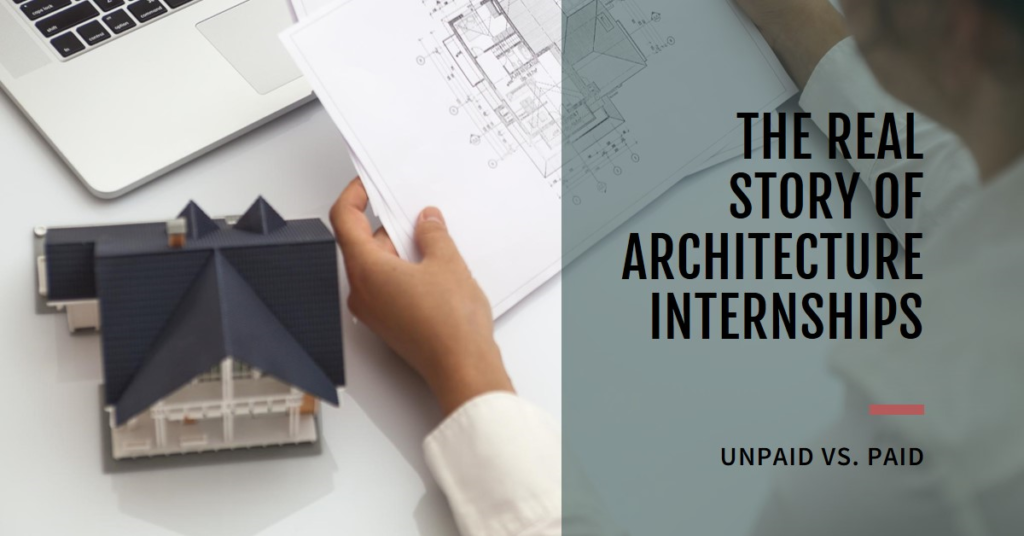
Table of Contents
Introduction : Architecture Internships
Architecture Internships – In the realm of architecture, internships serve as a pivotal stepping stone for budding professionals to gain practical experience, hone their skills, and immerse themselves in the dynamic world of design and construction. However, the debate surrounding unpaid versus paid internships within the architectural sphere has sparked contentious discussions and raised ethical considerations. This blog post aims to dissect the intricacies of both unpaid and paid internships, shedding light on the real story behind each option.
Understanding Unpaid Internships: Perceived Opportunities vs. Hidden Costs
Unpaid internships have long been perceived as an entry point for aspiring architects to gain valuable industry experience while sacrificing immediate financial compensation. Advocates argue that such opportunities provide invaluable exposure to real-world projects, mentorship from seasoned professionals, and networking prospects within architectural firms. However, beneath the surface allure lie hidden costs and ethical dilemmas.
While unpaid internships may offer access to prestigious firms and high-profile projects, they often exploit the labor of inexperienced individuals for menial tasks, such as drafting, model-making, or administrative duties. Moreover, the financial burden placed on interns, including expenses related to transportation, housing, and daily sustenance, can be prohibitive, particularly for those from disadvantaged backgrounds. Despite the potential for skill development, the lack of compensation perpetuates socio-economic barriers and undermines the value of interns’ contributions to the architectural practice.
Navigating the Landscape of Paid Internships: Balancing Remuneration and Professional Growth
In contrast, paid internships provide a semblance of financial stability and recognition for interns’ contributions while offering valuable learning opportunities within architectural firms. Unlike their unpaid counterparts, paid interns receive monetary compensation for their work, ranging from stipends to hourly wages, commensurate with their skills and responsibilities. This financial remuneration not only acknowledges interns’ labor but also fosters a sense of professional worth and incentivizes commitment to their roles.
Moreover, paid internships often prioritize skill development and career advancement by assigning meaningful projects, encouraging mentorship from experienced architects, and facilitating participation in client meetings and design discussions. By compensating interns for their time and expertise, architectural firms uphold ethical standards and promote inclusivity within the profession, attracting diverse talent and fostering a culture of equity and respect.
Unveiling the Ethical Implications: Equity, Diversity, and Inclusion
Central to the debate on architectural internships are the ethical implications surrounding equity, diversity, and inclusion within the profession. Unpaid internships perpetuate systemic inequalities by favoring individuals with financial means, excluding those who cannot afford to work without compensation. This perpetuates a cycle of privilege and restricts access to opportunities for aspiring architects from marginalized communities.
Conversely, paid internships uphold principles of fairness and inclusivity by valuing interns’ contributions and providing equal access to professional development regardless of socio-economic background. By embracing diversity and offering equitable compensation, architectural firms not only enrich their talent pool but also contribute to a more representative and inclusive built environment reflective of society’s plurality.


Debunking the Myth of “Experience Over Compensation”
A common refrain in defense of unpaid internships is the notion that experience trumps compensation, with proponents arguing that the skills and knowledge gained outweigh the financial sacrifice. While experiential learning is undoubtedly valuable, it should not come at the expense of interns’ financial well-being or perpetuate exploitative labor practices.
Paid internships offer a middle ground wherein interns receive fair compensation for their contributions without compromising on the quality of experiential learning. By aligning financial incentives with professional development, architectural firms demonstrate a commitment to ethical practices and cultivate a supportive environment conducive to interns’ growth and success.
Legal Considerations: Compliance with Labor Laws and Fair Employment Practices
In many jurisdictions, the legality of unpaid internships is governed by labor laws and fair employment practices aimed at protecting interns from exploitation and ensuring equitable treatment in the workplace. While some countries permit unpaid internships under specific conditions, such as academic credit or volunteer arrangements, others mandate minimum wage requirements for interns performing productive work.
Architectural firms must navigate these legal frameworks carefully to avoid potential liabilities and reputational damage associated with labor violations. By adhering to fair employment practices and compensating interns fairly for their contributions, firms mitigate legal risks and uphold their ethical responsibilities as employers within the architectural profession.
The Impact of Internship Policies on Career Trajectories: Setting Precedents for Professional Growth
The internship experience plays a crucial role in shaping architects’ career trajectories and influencing their transition from academia to professional practice. The policies and practices adopted by architectural firms regarding intern compensation and professional development can have far-reaching implications for interns’ long-term success and job satisfaction.
Firms that prioritize equitable compensation and meaningful learning experiences not only attract top talent but also foster a culture of loyalty and retention among interns. By investing in interns’ growth and well-being, firms lay the groundwork for future leaders in the architectural profession and set positive precedents for ethical employment practices across the industry.
Conclusion
In conclusion, the debate surrounding unpaid versus paid internships in architecture extends beyond financial considerations to encompass ethical, legal, and professional implications. While unpaid internships may offer access to prestigious firms and valuable learning experiences, they often perpetuate inequities and exploit interns’ labor without adequate compensation. In contrast, paid internships prioritize fairness, inclusivity, and professional development, setting a precedent for ethical employment practices within the architectural profession. By reevaluating internship policies and embracing equitable compensation, architectural firms can foster a more diverse, inclusive, and sustainable future for the next generation of architects.



